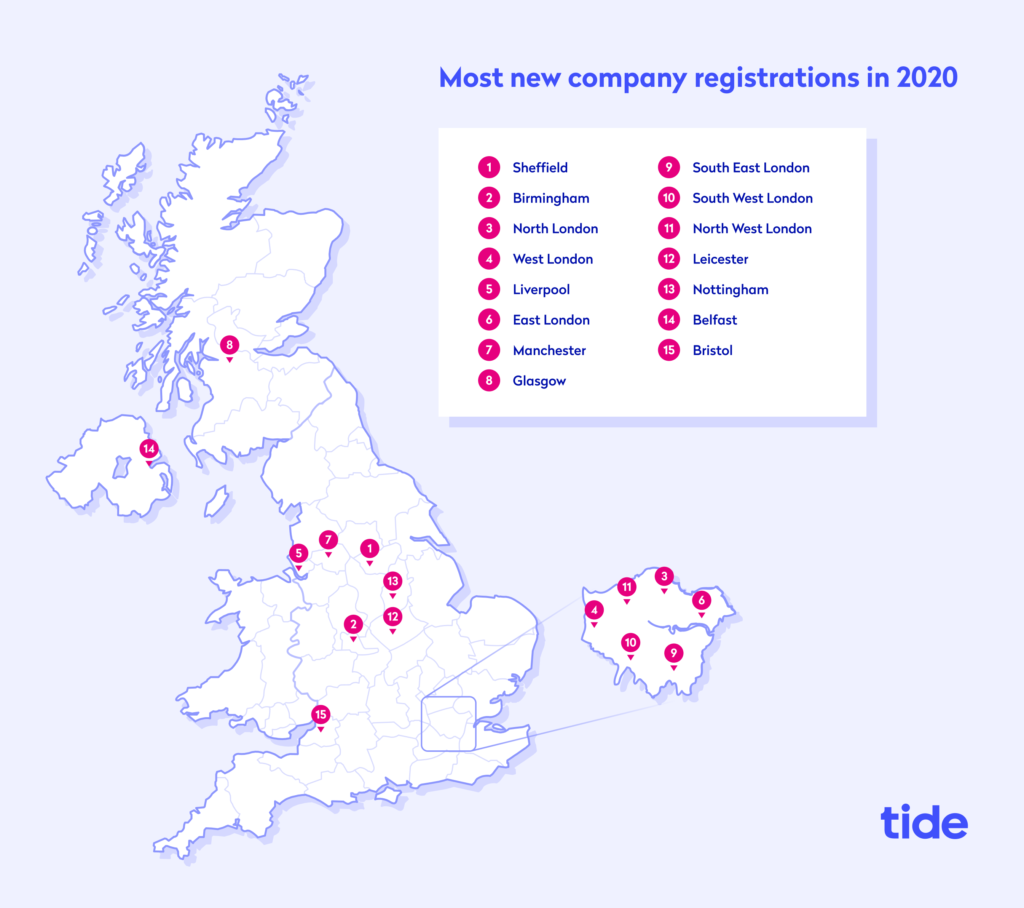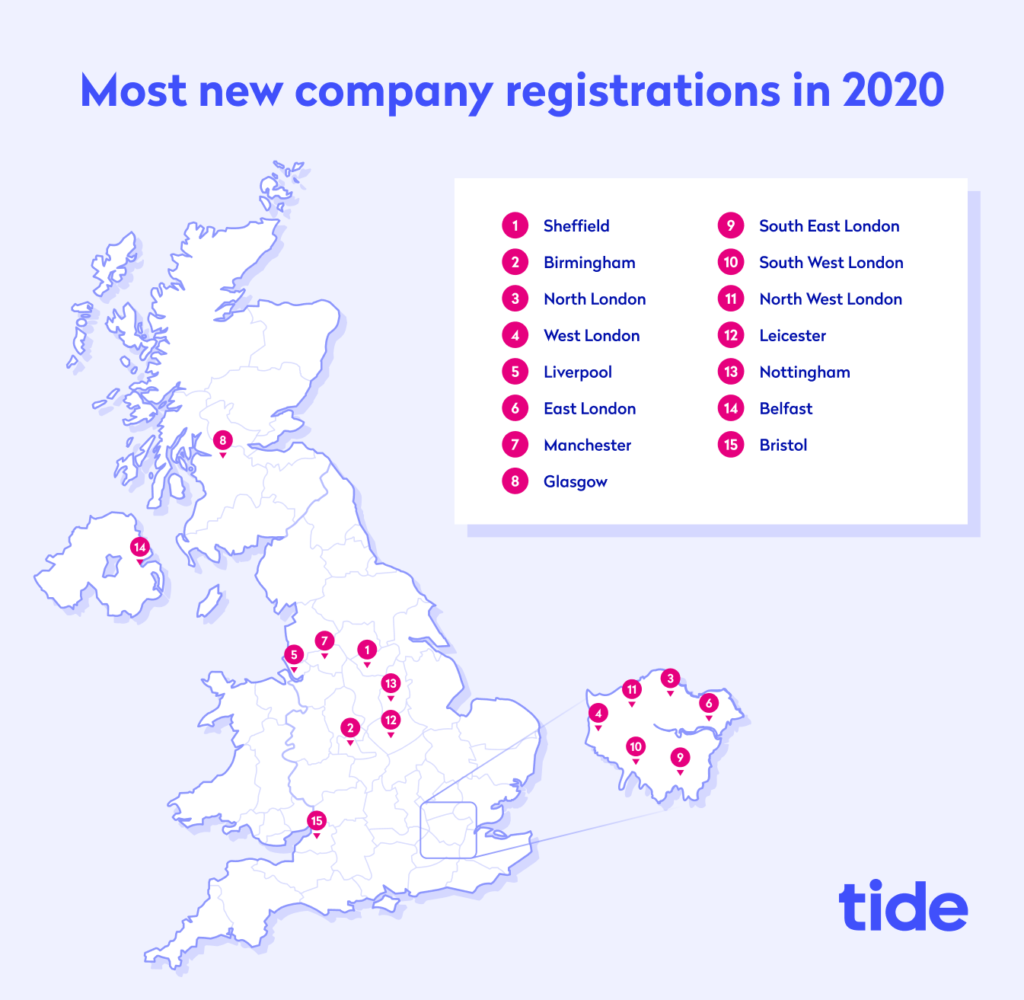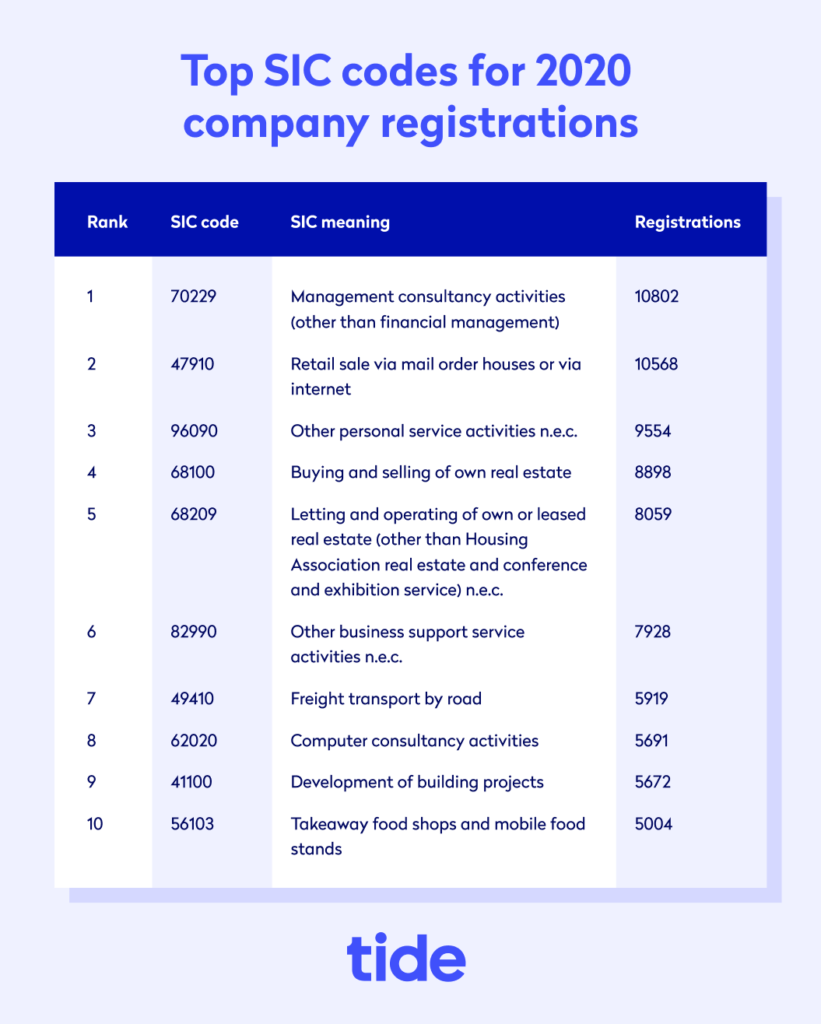
278,325 new companies registered in 2020. Here’s what they tell us.

Reasons to be cheerful may have been thin on the ground in 2020, but here’s one reason to be optimistic: the birth of thousands of new business ventures.
Lockdown may have restricted our movements, but it has done little to dampen our determination or our enterprising spirit. Despite being unable to travel, network or visit suppliers, the UK has seen the creation of thousands of new businesses in 2020.
What can we learn about the 278,325 new businesses that were registered with Companies House this year?
We’ve analysed the new company registration data from Companies House, from 1 January to 31 May 2020, and identified a few key themes.
Before we dive into our findings, it’s important to note that these interpretations of the data are based on a limited view of Companies House data, and this information should not be used in isolation to make major business decisions.
1: Businesses are still being formed at an impressive rate
Even in the midst of lockdown and the grip of a global pandemic, an average of 55,000 new companies were formed every month in 2020. While there is a clear dip in activity in April, when just 42,000 companies were created, May bounced back with 58,650.
This is a strong performance compared to January and February, before the world had encountered COVID-19, which both recorded around 60,000 new company registrations.
For comparison, the final quarter of 2019 saw an average of roughly 52,000 company formations per month.
April of this year recorded the most significant fall in company formations. This may simply reflect that many people were still coming to terms with the reality of lockdown and figuring out their next steps.
The surprising finding is that the pandemic has not caused a more significant drop in company formations.
The virus has been catastrophic for the economy as a whole, certainly, but people are still living, working, and shopping from home, ensuring a steady supply of demand for companies that can cater to their needs.
According to the Companies House data, when it came to the locations that the businesses were registered to, Sheffield saw the highest number of business registrations with Companies House, with more than twenty-one thousand (21,291).
The top 15 locations, based on the businesses’ registered postcode, included:


Sheffield was followed by Birmingham and North London, with 17,099 and 13,566 respectively. As you can see, the main cluster appears in London, with another arc in the North England / Midlands region. Glasgow, Belfast and Bristol are the only inclusions in the top 15 to appear away from these clusters.
To see data on every UK postcode area, hover over the interactive map below, which shows each location, its ranking position, and the number of businesses that have been registered with Companies House between 1st January 2020 and 31st May 2020.
2: Fewer companies closed during quarantine
Has the government furlough scheme rescued businesses that might otherwise have failed?
During the final quarter of 2019, before Coronavirus, an average of 47,000 businesses ceased trading each month.
While January and February continued this pattern with 44,602 and 46,163 businesses closing respectively, April saw just 13,413 companies close.
And in May, a mere 3,062 companies shut up shop.
What happened here?
One possibility is that companies have simply paused activity during lockdown. They may have taken advantage of the Self-Employment Income Support Scheme, or chosen to pay workers using the Coronavirus Job Retention Scheme. Some companies may be clinging on to see if they can survive in a post-lockdown economy.
While these government programs have undoubtedly saved many companies from collapse, and helped people survive during the pandemic, they may have propped up businesses that were on the brink of failure. As government support schemes close, there may be a second surge in company closures, particularly in the travel, hospitality, and manufacturing sectors.
3: Redundancies may have nudged people to start businesses
The histories of small businesses often start with, “I was laid off, so I decided to start a company…”
It’s hardly surprising that, as people cope with the sting of sudden unemployment, many will turn their attention to going solo, and taking control of their own fortunes and futures.
This is a common scenario in ordinary times, but in the era of COVID-19, when so many companies are struggling, and so few are hiring, the effect may be more pronounced.
According to a survey by CIPD, a fifth of employers plan to make some redundancies over the next three months. UK jobcentre claimants have risen by 23% to 2.8m during the coronavirus crisis (Guardian).
In these conditions, starting a business may feel like the only way to earn a living.
For other people, this moment presents the opportunity to pursue a long-held dream.
Whether through force or through choice, coronavirus may inspire a wave of entrepreneurs to turn their backs on regular employment.
4: Lockdown conditions are ideal for some enterprises
Coronavirus, and the lockdown it prompted, have devastated thousands of companies that rely on the free movement of people.
Conversely, Coronavirus has been a boon for companies that can deliver their products to homes, and companies that can deliver services remotely or virtually.
Lockdown has created a surge in demand for delivery services in particular.
Beyond major ecommerce retailers, many local companies have rushed to offer home delivery on everything from produce to pot plants. And countless enterprising souls now act as freelance fetchers and fixers for people temporarily stranded at home.
Companies House data supports what we’ve all seen happening: E-commerce and home delivery companies are the second most popular company type registered up to the end of May 2020, with 10,568 new companies formed.

Take away food shops and mobile food stands were responsible for 5004 new companies, compared to just 2861 licensed restaurants. And one would presume that those restaurants all commenced before lockdown was even a word in our vocabulary.
5: The recession may be V-shaped
Looking beyond the Companies House data, and trying to assess the economic climate, the signs are mixed.
While other recent recessions have been caused by financial shocks that radiated out from within the financial markets, lockdown has created a sort of artificial recession. Louise Sheiner of the Brookings Institution makes this point: “The Great Recession was a result of financial imbalances—starting primarily in the housing sector. This one is from a totally external factor, the coronavirus disease (COVID-19).”
The primary reason for a fall in spending is our limited field of movement. It’s hard to spend money when you can’t leave the house.
This could mean that the corona-recession is short and sharp – a dramatic V-shape on financial charts – rather than the long, slow recoveries we faced after the Great Recession (2008) or the 1990s recession.
Whatever the shape of the Coronavirus recession, it’s important to remember that a recession simply means two quarters of declining GDP. Even during the worst financial crashes, the majority of normal life continues, and most healthy businesses are able to survive a spell of reduced income and activity.
Is now a good time to start a company?
Thinking of starting a company in 2020?
You might wonder if this is a bad time to start a business.
And you’re right to ask this question.
But this is a question you would need to answer at any time. Even during ‘perfect’ economic conditions, no business is guaranteed to succeed.
Every business founder has to go through a process of evaluating the potential of their new venture to take off, and calculate the risks of failure.
As the Companies House data shows, thousands of people are starting companies right now. People are forming new businesses in the midst of a global pandemic, fully aware of what it will take to succeed in this environment.
If your new venture is designed to operate in these challenging conditions, and has the ability to adapt and shift as lockdown eases and the world returns to normal, then you have the best chance of success.
With Tide, you can register a limited company and open a business bank account, all in one go, for free. Got burning questions about registering a limited company? Everything you need to know can be found here: https://www.tide.co/company-registration/
—
All data and sources can be found here.
Photo by Bethany Legg, published on Unsplash






